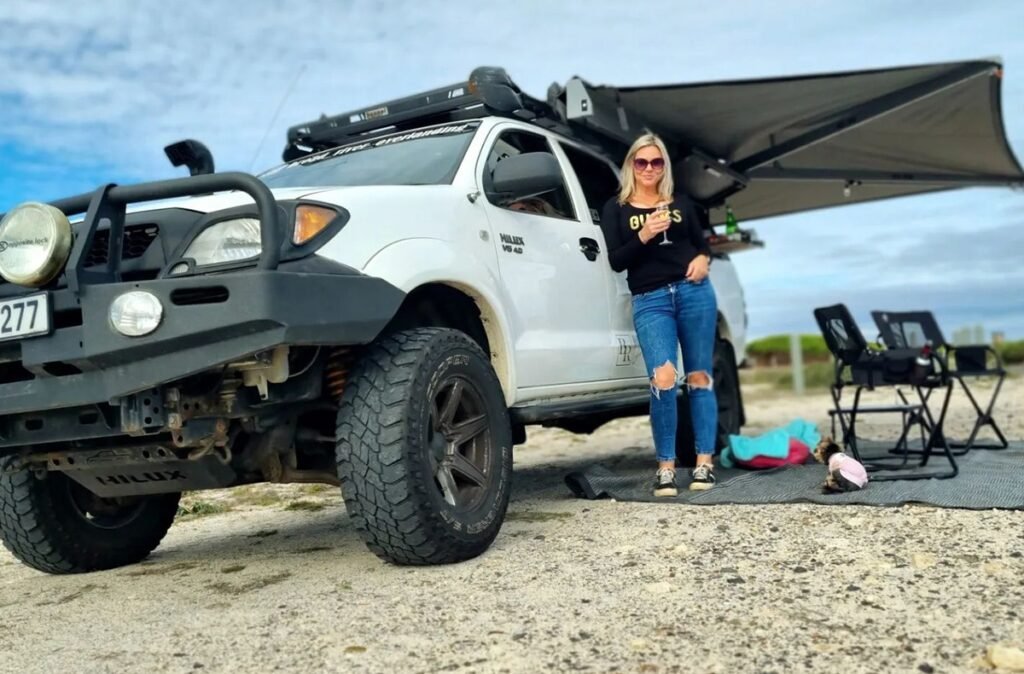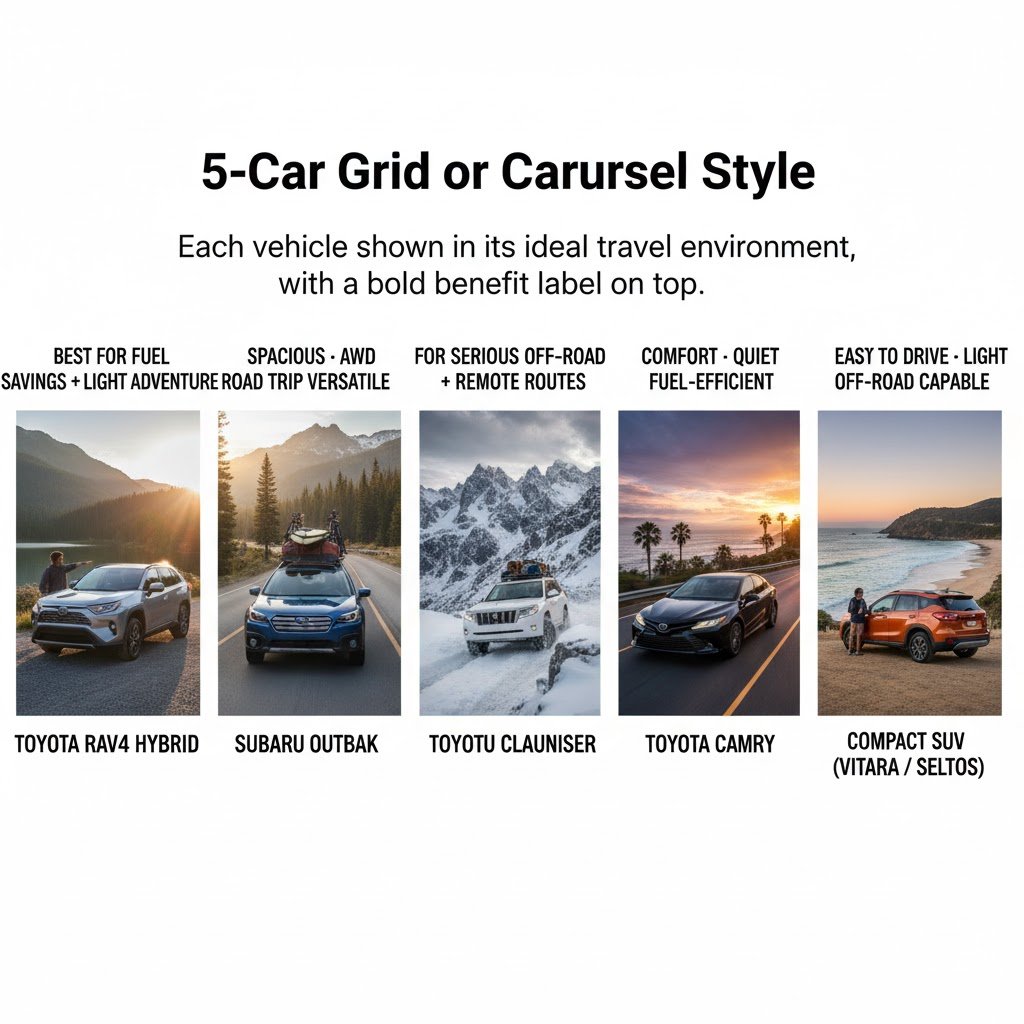Road trips in New Zealand are among the most spectacular journeys in the world: winding coastal roads, alpine passes, vast distances between towns in the South Island, lush forests, beaches, and dramatic weather changes. To make the most of the scenery, avoid fatigue, and enjoy every moment, having the right car matters. Whether you’re planning to drive from Christchurch across the Southern Alps, circle the North Island, or explore remote corners, choosing a suitable vehicle can make or break the adventure.
Why the Right Car Matters for Kiwi Road Trips
- Varied terrain & road conditions: From sealed highways to gravel roads, steep hills, mountain passes (like Arthur’s Pass or Haast Pass), and windy coastal routes. The car must handle both comfort on smooth long stretches and stability off the beaten path.
- Distance between fuel & service stations: Especially in the South Island, services can be far apart. A car with good fuel economy, reliable mechanics, and decent fuel tank range reduces stress.
- Weather and seasonal change: Snow, rain, wind, and sun all in one trip are common. You’ll want good heating/air-conditioning, safe tyres, possibly four wheel drive (4WD) or all wheel drive (AWD) if you plan to go off main roads or in winter.
- Comfort and storage: Long drives mean many hours in the driver’s seat. Good seating, smooth ride, low noise, space for luggage, camping gear or sports equipment, and reliable safety features make the journey pleasurable.
What to Look for in a Road Trip Vehicle in New Zealand

Here are key features to prioritise:
| Feature | Why It’s Important |
| Fuel type & efficiency | To save on petrol/diesel cost, and avoid frequent refuels in remote areas. Hybrid or efficient petrol/diesel engines can help. |
| Size & storage | Enough room for passengers + luggage + gear. Roof racks or hitch capacity can be a bonus. |
| Drivetrain (AWD / 4WD vs 2WD) | If staying mostly on sealed roads, a 2WD may suffice. But if you plan on gravel roads, backcountry, or winter snow, AWD or 4WD adds safety margin. |
| Ground clearance & tyres | Helps when roads are rough or during wet weather. |
| Comfort & amenities | Good suspension, cruise control, reliable A/C, audio, navigation. Long stretches demand comfort. |
| Safety features | ABS, traction control, airbags, stability systems; in NZ many rental fleets have newer models with modern safety kits. |
| Reliability & servicing network | Brands with good reputation in NZ matter; parts/service should be easily available. |
5 Best Cars for Long Road Trips

Below are five vehicle types / specific models that are well suited for long journeys in New Zealand, along with pros & cons and recommended use-cases.
1. Toyota RAV4 Hybrid
Pros: Excellent fuel efficiency, modern safety features, decent ground clearance, reliable brand and parts/support across NZ. Works well both in towns and for longer stretches, mixed roads.
Cons: Hybrid batteries mean less towing capacity; more expensive rental prices; may struggle a little off very rough gravel roads.Best for: travellers who want eco-friendly, all-round comfort, light off-road capability, and low fuel consumption.
2. Subaru Outback / equivalent wagon / crossover
Pros: Often has AWD, high ground clearance, excellent cargo space; comfortable for long highway stretches and rougher back-roads. Good for groups or families with bags.Cons: Larger body means more fuel; servicing in remote areas more limited; sometimes higher rental cost.
Best for: travellers who want flexibility to explore both paved and unpaved roads, maybe camping gear, mild off-road segments, and spacious interiors.
3. Toyota Land Cruiser (or similar 4WD SUV)
Pros: Superb for rugged terrain, snow, steep climbs (e.g. in the Southern Alps), or when you expect to go off the beaten track. Very durable.Cons: Fuel consumption high; expensive to rent; large in tight roads or parking; heavier, more expensive maintenance.
Those planning serious off-road or winter adventures, remote road trips, or hauling gear and people.
4. Toyota Camry or a midsize sedan (petrol / hybrid)
Pros: Very comfortable for long runs on the highway, quiet cabin, more affordable rentals, better fuel efficiency especially with hybrid, easy to drive in city and on highways.Cons: Less ground clearance; limited capability for rough or remote roads; less room for large gear.
Travellers planning mostly sealed roads, highways, no major off-road, and who value comfort and economy over ruggedness.
5. Compact SUV / Crossover (e.g. Suzuki Vitara, Kia Seltos, or equivalents)
Pros: A good compromise – decent space, moderate fuel consumption, easier parking/manoeuvre, some grip on light gravel. Cheaper to rent than full SUVs.Cons: Less powerful; lower ground clearance than full 4WD; less towing/gear capacity.
couples or small groups wanting flexibility, lightweight gear, mostly tourist roads with occasional gravel.
Christchurch as a Great Starting Point for a South Island Road Trip
Christchurch is ideally placed for launching a South Island road trip adventure. The city has an international airport with many car rental options, so you can arrive by air then hit the road without delay. Starting from Christchurch gives you access to spectacular routes such as:
- The Great Alpine Highway (Christchurch ↔ Greymouth) – scenic traverse over the Southern Alps.
- Turning south toward Mt Cook / Aoraki, Lake Tekapo, Wanaka, Queenstown.
- Coastal routes north toward Kaikōura, Marlborough or down toward Dunedin and Fiordland.
When renting in Christchurch, keep these in mind:
- Rent from outside the Christchurch airport terminals for potentially lower fees.
- Book ahead, especially during NZ summer (December-March), to get better rates and vehicle availability.
- Be aware of insurance, road rules, fuel policies. Christchurch has stretches of open road, winding rural roads, so having the right size car, coverage (especially for gravel damage) is critical.
Tips for Choosing the Right Rental
- Book in advance – you’ll get better selection and better rates. Peak season drives prices up and reduces choice.
- Choose the fuel policy carefully – full-to-full is usually the fairest. Avoid “return empty” or “fuel charged at premium rate” policies.
- Check insurance & damage cover – especially for gravel roads, bridges, rental excess, damage outside sealed surfaces. Understand what is covered.
- Inspect the car before driving off – note existing damage, tyre condition, spare tyre, tools, etc. Take pictures.
- Opt for vehicle features that reduce fatigue – cruise control, comfortable seats, decent audio/entertainment, navigation or GPS/phone mount.
- Understand distance & mileage limits – some rentals limit km; NZ has large distances, so unlimited or high limit mileage rentals are preferable.
- Choose tyres & ground clearance appropriate to your route – if you’ll be on gravel or mountain passes, you’ll want sturdy tyres, maybe even all-terrain ones provided by the rental.
Conclusion
In New Zealand, where the journey is just as breathtaking as the destination, having the right car transforms your road trip from taxing to unforgettable. Whether you choose a hybrid like the RAV4, a rugged 4WD, or a comfy sedan, balance what your route demands, comfort, reliability, and fuel economy. Starting from Christchurch gives you many route options and logistics flexibility. Plan carefully, choose wisely, and you’ll be free to enjoy every mountain pass, coastline, and valley in between.
Frequently Asked Questions
Q: Should I choose petrol, diesel, or hybrid for my trip?
- Petrol: fine for most travellers, reliable, plentiful service stations; tends to be cheaper in purchase price; slightly less fuel-efficient than diesel in long highway runs.
- Diesel: better torque, often more efficient at highway speeds, especially in heavier SUVs or 4WDs; but fuel prices and service cost may be higher, and some environmental regulations or fees might apply.
- Hybrid: excellent choice if much of your trip is on sealed roads with stop/start (towns, hill climbs), or when fuel efficiency is important. Battery-assist reduces fuel use. Downside: higher upfront cost/rental, battery capacity and service availability should be checked.
Q: What makes a car ideal for long road trips in New Zealand?
- Comfort (seating, cabin noise, climate control)
- Durability and service network availability
- Ability to handle NZ’s varied and sometimes harsh road conditions (gravel, alpine passes, winding coastal roads)
- Good fuel efficiency and reasonable fuel tank size for covering long distances between fill-ups
- Safety features and reliability
Q: Are automatic or manual cars better for road trips in New Zealand?
- Automatic: easier, less tiring especially in hilly, windy, or stop-start traffic; many rental fleets are moving toward automatics.
- Manual: sometimes cheaper to rent; can give more control especially in steep or slippery conditions; however, less common, and driver must be comfortable.
- Choice depends on personal preference, driving experience, and route (if steep climbs or tricky terrain, you may want the control of manual, but automatics are increasingly good and convenient).
Useful External Links & Resources
- For insights on owning a car in NZ including maintenance averages, see this guide: Owning a Car for Travel in New Zealand – Average Maintenance Guide
- To compare rental comfort and value in another setting, which helps understand what to expect, see: Seamless Car Rental at Dubai Airport – Comfort, Choice and Value
- First Light Travel’s advice on choosing the right rental car for self-drive holidays in NZ. First Light Travel

